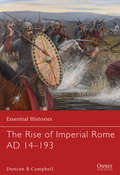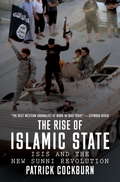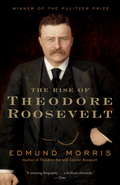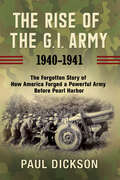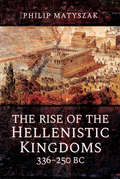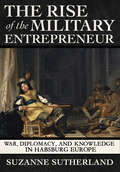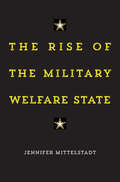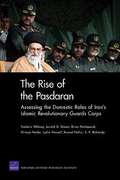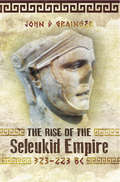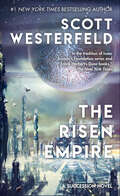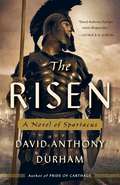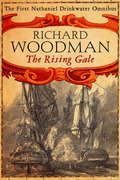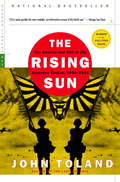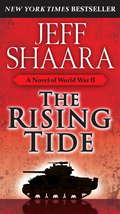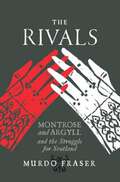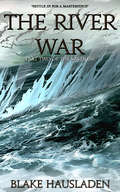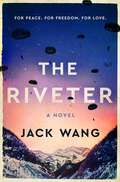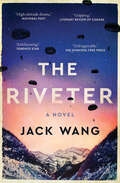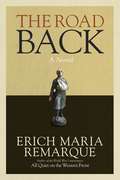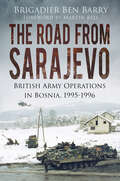- Table View
- List View
The Rise of Imperial Rome AD 14-193
by Duncan CampbellWhen Augustus (r. 27 BC-AD 14) came to the throne as the first emperor of Rome, he began to bring order to the chaos that almost 20 years of civil war had wrought. Areas that had been added piecemeal to the Roman Republic, from Spain and Gaul to Dalmatia, needed to be restructured as provinces of the empire, while in the East, Augustus reorganised Asia Minor and Syria, and held the Parthian empire in check with cunning diplomacy. The foundations of the empire were thus laid by Augustus, and his aspirations for world conquest were passed on to his successors, who would strive to defend, expand and consolidate the empire after his death. Under Trajan (AD 98-117) the empire reached its largest extent - some 6.5 million square kilometres. Its presence in much of present-day Western and Central Europe gave the area a lasting legacy in a range of areas, from legal matters to languages and from architecture to religious belief.In this book ancient-warfare specialist Duncan Campbell explores the course of the wars that ensued as successive emperors sought to extend the empire, from Claudius' conquest of Britannia (AD 43) and Domitian's campaigns on the Rhine (AD 83) and the Danube (AD 89, 92), through Trajan's Dacian Wars (AD 101-03, 105-06) and Parthian War (AD 117), to Marcus Aurelius' Marcomannic Wars (AD 167-75, 177-80), as well as the Jewish Wars (AD 66-74 and AD 132-36). The period covered in this book ends with the consolidation of the Roman frontiers along the Rhine and Danube - 'this far and no further' - and uneasy peace with the Parthian empire, wracked by its own internal troubles. The murder of the emperor Pertinax in AD 193 was to usher in a period of instability and civil war, dominated by the mighty Septimius Severus (r. AD 193-212).This book provides a summary of the strengths, limitations and evolving character of the Roman army during the first two centuries AD, as well as those of the forces of Rome's enemies across the Rhine and Danube in Germany and Romania, and in the East, in the form of the Parthian empire of Iraq/Iran. The characters and achievements of the soldiers and civilians who fought Rome's enemies and administered the new provinces carved out in war are brought to life in vivid detail. Fully illustrated with photographs depicting the emperors, their armies and enemies, and the remains of Roman fortifications and public buildings, plus informative full-colour maps, this is the epic story of the wars waged by a succession of emperors during the period in which Imperial Rome reached its zenith.
The Rise of Islamic State
by Patrick CockburnOut of the failures of Iraq and Afghanistan, the Arab Spring and Syria, a new threat emerges. While Al Qaeda is weakened, new jihadi movements, especially ISIS, are starting to emerge. In military operations in June 2014 they were far more successful than Al Qaeda ever were, taking territory that reaches across borders and includes the city of Mosul. The reports of their military coordination and brutality are chilling. While they call for the formation of a new caliphate once again the West becomes a target. How could things have gone so badly wrong? In The Rise of Islamic State, Cockburn analyzes the reasons for the unfolding of US and the West's greatest foreign policy debacle and the impact that it has on the war-torn and volatile Middle East.From the Trade Paperback edition.
The Rise of Modern Communism (Third Edition)
by Massimo SalvadoriThe book is about the communist movement in the twentieth century. Author says that communism is described as the natural and almost inevitable expression of Marxism.
The Rise of Theodore Roosevelt: The Rise Of Theodore Roosevelt, Theodore Rex, And Colonel Roosevelt (Modern Library 100 Best Nonfiction Books)
by Edmund MorrisThis is Morris's highly acclaimed account of Theodore Roosevelt's life, encompassing the years from Roosevelt's birth to his service in the White House. He was one of our most vibrant presidents; his image still haunts our past and our present. This fascinating and comprehensive biography of the extraordinary naturalist, adventurer, soldier, and politician, tells the improbable, but very real, story of a man determined to get what he wanted, an American who helped define our century and our very character.<P><P> Winner of the Publitzer Prize<P> Winner of the National Book Award
The Rise of the G.I. Army, 1940–1941: The Forgotten Story of How America Forged a Powerful Army Before Pearl Harbor
by Paul Dickson“A must-read book that explores a vital pre-war effort [with] deep research and gripping writing.” —Washington TimesIn The rise of the G.I. Army, 1940–1941, Paul Dickson tells the dramatic story of how the American Army was mobilized from scattered outposts two years before Pearl Harbor into the disciplined and mobile fighting force that helped win World War II.In September 1939, when Nazi Germany invaded Poland and initiated World War II, America had strong isolationist leanings. The US Army stood at fewer than 200,000 men—unprepared to defend the country, much less carry the fight to Europe and the Far East. And yet, less than a year after Pearl Harbor, the American army led the Allied invasion of North Africa, beginning the campaign that would defeat Germany, and the Navy and Marines were fully engaged with Japan in the Pacific.Dickson chronicles this transformation from Franklin Roosevelt’s selection of George C. Marshall to be Army Chief of Staff to the remarkable peace-time draft of 1940 and the massive and unprecedented mock battles in Tennessee, Louisiana, and the Carolinas by which the skill and spirit of the Army were forged and out of which iconic leaders like Eisenhower, Bradley, and Clark emerged. The narrative unfolds against a backdrop of political and cultural isolationist resistance and racial tension at home, and the increasingly perceived threat of attack from both Germany and Japan.
The Rise of the Hellenistic Kingdoms, 336–250 BC
by Philip MatyszakThe author of 24 Hours in Ancient Athens&“tells the powerful story of how Greek history survived the meteor of Alexander and his brief world empire&” (Firetrench). When Alexander the Great died in 323 BC, he left an empire that stretched from the shores of the Adriatic to the mountains of Afghanistan. This empire did not survive Alexander&’s death, and rapidly broke into several successor states. These states, substantial kingdoms in their own right, dominated Asia Minor, Greece, the Levant and Egypt for the next three hundred years. While Philip Matyszak&’s narrative covers their remarkable contribution of the Eastern Greeks in fields such as philosophy, science and culture, the main focus is on the rivalry, politics and wars, both civil and foreign, which the Hellenistic rulers constantly fought among themselves. As in other fields, the Successor Kingdoms were innovators in the military and diplomatic field. Indeed, their wars and diplomatic skirmishes closely presage those of eighteenth-century Europe and the superpower rivalries of the twentieth century. The complex interaction of these different kingdoms, each with its own character and evolving military systems, combined geopolitics and grand strategy with diplomatic duplicity, and relentless warfare. The epic story of the successor states is full of flawed heroes, palace intrigue, murder, treachery, incest, rebellion and conquest.
The Rise of the Hellenistic Kingdoms, 336–250 BC
by Philip MatyszakThe author of 24 Hours in Ancient Athens&“tells the powerful story of how Greek history survived the meteor of Alexander and his brief world empire&” (Firetrench). When Alexander the Great died in 323 BC, he left an empire that stretched from the shores of the Adriatic to the mountains of Afghanistan. This empire did not survive Alexander&’s death, and rapidly broke into several successor states. These states, substantial kingdoms in their own right, dominated Asia Minor, Greece, the Levant and Egypt for the next three hundred years. While Philip Matyszak&’s narrative covers their remarkable contribution of the Eastern Greeks in fields such as philosophy, science and culture, the main focus is on the rivalry, politics and wars, both civil and foreign, which the Hellenistic rulers constantly fought among themselves. As in other fields, the Successor Kingdoms were innovators in the military and diplomatic field. Indeed, their wars and diplomatic skirmishes closely presage those of eighteenth-century Europe and the superpower rivalries of the twentieth century. The complex interaction of these different kingdoms, each with its own character and evolving military systems, combined geopolitics and grand strategy with diplomatic duplicity, and relentless warfare. The epic story of the successor states is full of flawed heroes, palace intrigue, murder, treachery, incest, rebellion and conquest.
The Rise of the Military Entrepreneur: War, Diplomacy, and Knowledge in Habsburg Europe
by Suzanne SutherlandThe Rise of the Military Entrepreneur explores how a new kind of international military figure emerged from, and exploited, the seventeenth century's momentous political, military, commercial, and scientific changes. In the era of the Thirty Years' War, these figures traveled rapidly and frequently across Europe using private wealth, credit, and connections to raise and command the armies that rulers desperately needed. Their careers reveal the roles international networks, private resources, and expertise played in building and at times undermining the state.Suzanne Sutherland uncovers the influence of military entrepreneurs by examining their activities as not only commanders but also diplomats, natural philosophers, information brokers, clients, and subjects on the battlefield, as well as through strategic marital and family allegiances. Sutherland focuses on Raimondo Montecuccoli (1609–80), a middling nobleman from the Duchy of Modena, who became one of the most powerful men in the Austrian Habsburg monarchy and helped found a new discipline, military science. The Rise of the Military Entrepreneur explains how Montecuccoli successfully met battlefield, court, and family responsibilities while contributing to the world of scholarship on an often violent, fragmented political-military landscape. As a result, Sutherland shifts the perspective on war away from the ruler and his court to instead examine the figures supplying force, along with their methods, networks, and reflections on those experiences.
The Rise of the Military Welfare State
by Jennifer MittelstadtAfter Vietnam the army promised its all-volunteer force a safety net long reserved for career soldiers: medical and dental care, education, child care, financial counseling, housing assistance, legal services. Jennifer Mittelstadt shows how this unprecedented military welfare system expanded at a time when civilian programs were being dismantled.
The Rise of the Pasdaran: Assessing the Domestic Roles of Iran's Islamic Revolutionary Guards Corps
by Frederic Wehrey Jerrold D GreenIran's Islamic Revolutionary Guards Corps (IRGC)--also known as the Pasdaran (Persian for "guards")--was initially created by Ayatollah Khomeini during the 1978-1979 Islamic Revolution as an ideological guard for the nascent regime. Since then, it has evolved into an expansive socio-political-economic conglomerate whose influence extends into virtually every corner of Iranian political life and society. In the political sphere, many high-ranking officials are former Pasdaran. As a force in Iranian culture and society, the IRGC controls media outlets and conducts training and education programs that are designed not only to bolster loyalty to the regime and train citizens in homeland defense, but also to improve the IRGC's own institutional credibility. And on the economic front, the IRGC controls a wide variety of commercial enterprises, including both government contracting and illicit smuggling and black-market enterprises. In this monograph, the authors assess the IRGC less as a traditional military entity and more as a domestic actor, emphasizing its multidimensional nature and the variety of roles it plays in Iran's political culture, economy, and society.
The Rise of the Seleukid Empire, 323–223 BC: Seleukos I to Seleukos III
by John D. GraingerThe first of three books on the ancient Greek dynasty &“reads with the pull of a novel and shows how the new Empire rose and fell.&”—Firetrench The Seleukid kingdom was the largest state in the world for a century and more between Alexander&’s death and the rise of Rome. The first king, Seleukos I, established a pattern of rule which was unusually friendly towards his subjects, and his policies promoted the steady growth of wealth and population in many areas which had been depopulated when he took them over. In particular the dynasty was active in founding cities from Asia Minor to Central Asia. Its work set the social and economic scene of the Middle East for many centuries to come. Yet these kings had to be warriors too as they defended their realm from jealous neighbors. John D Grainger&’s trilogy charts the rise and fall of this superpower of the ancient world. In the first volume, he relates the remarkable twists of fortune and daring that saw Seleukos, an officer in an elite guard unit, emerge from the wars of the Diadochi (Alexander&’s successors) in control of the largest and richest part of the empire of the late Alexander the Great. After his conquests and eventual murder, we then see how his successors continued his policies, including the repeated wars with the Ptolemaic rulers of Egypt over control of Syria. The volume ends with the deep internal crisis and the Wars of the Brothers, which left only a single member of the dynasty alive in 223 BC.
The Risen Empire: Book One Of Succession (Succession #1)
by Scott Westerfeld“Westerfeld’s blend of traditional space opera and cutting-edge speculation makes this a truly twenty-first-century SF novel.” —Karl Schroeder, author of Pirate SunThe undead Emperor has ruled his mighty interstellar empire of eighty human worlds for sixteen hundred years. Because he can grant a form of eternal life, creating an elite known as the Risen, his power has been absolute. He and his sister, the Child Empress, who is eternally a little girl, are worshiped as living gods. No one can touch them.Not until the Rix, machine-augmented humans who worship very different gods: AI compound minds of planetary extent. The Rix are cool, relentless fanatics, and their only goal is to propagate such AIs throughout the galaxy. They seek to end, by any means necessary, the Emperor’s prolonged tyranny of one and supplant it with an eternal cybernetic dynasty of their own. They begin by taking the Child Empress hostage. Captain Laurent Zai of the Imperial Frigate Lynx is tasked with her rescue.Separated by light-years, bound by an unlikely love, Zai and pacifist senator Nara Oxham must each in their own way, face the challenge of the Rix, and they each will hold the fate of the empire in their hands. The Risen Empire is the first great space opera of the twenty-first century.“In the tradition of Isaac Asimov’s Foundation series and Frank Herbert’s Dune books.” —The New York Times“Confirms the buzz that space opera is one of the most exciting branches of current SF.” —Publishers Weekly (starred review)
The Risen: A Novel of Spartacus
by David Anthony DurhamFrom the author of the widely praised Pride of Carthage, the superb fictional rendering of Hannibal's epic military campaigns against Carthage's archenemy Rome, comes the perfect follow-up: an equally superb novel of the legendary gladiator Spartacus and the vast slave revolt he led that came ever so close to bringing Rome, with its supposedly invincible legions, to its knees. In this thrilling and panoramic historical novel we see one of the most storied uprisings of classical times from multiple points of view: Spartacus, the visionary captive and gladiator whose toughness and charisma turn a prison break into a multi-cultural revolt that threatens an empire; his consort, the oracular Astera, whose connection to the spirit world and its omens guides the uprising's progress; Nonus, a Roman soldier working both sides of the conflict in a half-adroit, half-desperate attempt to save his life; Laelia and Hustus, two shepherd children drawn into the ranks of the slave rebellion; Kaleb, the slave secretary to Crassus, the Roman senator and commander saddled with the unenviable task of quashing an insurrection of mere slaves; and other players in a vast spectacle of bloodshed, heroism, and treachery. In the pages of The Risen--the term the slaves in revolt have adopted for themselves--an entire, teeming world comes into view with great clarity and titanic drama, with nothing less than the future of the ancient world at stake. No one brings more verve, intelligence, and freshness to the novel of the classical age than David Anthony Durham.From the Hardcover edition.
The Rising Gale: An Eye of the Fleet, A King's Cutter, A Brig of War (Nathaniel Drinkwater Omnibus #6)
by Richard WoodmanAN EYE OF THE FLEET Nathaniel Drinkwater is engaged in dramatic action off the coast of Spain in Admiral Rodney's famous Moonlight Battle and the capture of the Santa Teresa. But his adventures also bring rebellion on board and a perilous expedition into the Carolina swamps. A KING'S CUTTER Clandestine operations off the coast of France aboard the twelve-gun cutter Kestrel involves Drinkwater in the French Revolution, rescuing refugees from Madame Guillotine and helping British agents infiltrate France. A BRIG OF WAR At the request of Nelson himself, Drinkwater is despatched to the Red Sea on an urgent mission, and he soon finds himself on a thrilling naval operation on the flank of Napoleon's Egyptian campaign.
The Rising Sun: The Decline and Fall of the Japanese Empire 1936-1945 (Modern Library War)
by John TolandThis history of World War II chronicles the dramatic rise and fall of the Japanese empire, from the invasion of Manchuria and China to the atomic bombing of Hiroshima and Nagasaki. Told from the Japanese perspective, The Rising Sun is, in the author's words, "a factual saga of people caught up in the flood of the most overwhelming war of mankind, told as it happened--muddled, ennobling, disgraceful, frustrating, full of paradox."In weaving together the historical facts and human drama leading up to and culminating in the war in the Pacific, Toland crafts a riveting and unbiased narrative history. In his Foreword, Toland says that if we are to draw any conclusion from The Rising Sun, it is "that there are no simple lessons in history, that it is human nature that repeats itself, not history."<P><P> Pulitzer Prize Winner
The Rising Tide: A Novel of World War II #1 (World War II #1)
by Jeff ShaaraA modern master of the historical novel, Jeff Shaara has painted brilliant depictions of the Civil War, the Revolutionary War, and World War I. Now he embarks upon his most ambitious epic, a trilogy about the military conflict that defined the twentieth century. The Rising Tide begins a staggering work of fiction bound to be a new generation's most poignant chronicle of World War II. With you-are-there immediacy, painstaking historical detail, and all-inclusive points of view, Shaara portrays the momentous and increasingly dramatic events that pulled America into the vortex of this monumental conflict. As Hitler conquers Poland, Norway, France, and most of Western Europe, England struggles to hold the line. When Germany's ally Japan launches a stunning attack on Pearl Harbor, America is drawn into the war, fighting to hold back the Japanese conquest of the Pacific, while standing side-by-side with their British ally, the last hope for turning the tide of the war. Through unforgettable battle scenes in the unforgiving deserts of North Africa and the rugged countryside of Sicily, Shaara tells this story through the voices of this conflict's most heroic figures, some familiar, some unknown. As British and American forces strike into the "soft underbelly" of Hitler's Fortress Europa, the new weapons of war come clearly into focus. In North Africa, tank battles unfold in a tapestry of dust and fire unlike any the world has ever seen. In Sicily, the Allies attack their enemy with a barely tested weapon: the paratrooper. As battles rage along the coasts of the Mediterranean, the momentum of the war begins to shift, setting the stage for the massive invasion of France, at a seaside resort called Normandy. More than an unprecedented and intimate portrait of those who waged this astonishing global war, The Rising Tide is a vivid gallery of characters both immortal and unknown: the as-yet obscure administrator Dwight D. Eisenhower, whose tireless efficiency helped win the war; his subordinates, clashing in both style and personality, from George Patton and Mark Clark to Omar Bradley and Bernard Montgomery. In the desolate hills and deserts, the Allies confront Erwin Rommel, the battlefield genius known as "the Desert Fox," a wounded beast who hands the Americans their first humiliating defeat in the European theater of the war. From tank driver to paratrooper to the men who gave the commands, Shaara's stirring portrayals bring the heroic and the tragic to life in brilliant detail. A new level of accomplishment from this already acclaimed author, The Rising Tide will leave readers eager for the next volume of this superb saga of the war that saved and changed the world.
The Rivals: Montrose and Argyll and the Struggle for Scotland
by Murdo FraserThis dual biography &“deftly revisits 17th century Scotland to assess the roles of…two charismatic nobles who fought for supremacy&” (Scotsman, UK). The struggles of the Scottish Civil War of 1644-45 could easily be personified as a contest between James Graham, 1st Marquis of Montrose and Archibald Campbell, 8th Marquis of Argyll. Yet at first glance there seems to be more that unites them than separates them. Both came from ancient and powerful families and considered themselves loyal subjects of Charles I. Both were also betrayed by Charles II and died at the hands of the executioner. In The Rivals, Murdo Fraser examines these two remarkable men and shines a light on their contrasting personalities. Montrose was a brilliant military tactician, bold and brave but rash. Campbell was altogether a more opaque figure, cautious, considered and difficult to read. The resulting volume offers a vivid insight into two individuals who played a significant part in writing Scotland's history, as well as a fascinating portrait of early modern Scotland.
The River War (The Vastness #2)
by Blake HausladenThis novella is part two of The Vastness, also available as a collection.War begins to brew as a desperate mission to the frozen edge of the world is mounted in order to rescue Enhedu’s stolen children.Average people gain magic and blood quickly becomes as important as air.“I’m not a daughter who needs to be warned of the dangers of the world. I’m a queen.” -Dia The Vastness is the third and final omnibus collection to the Vesteal Series. The Vastness takes us deep into the capital of Bessradi, following the chaos of Native Silver, where new magic is emerging. Ghosts stir, the ground shakes, and an unknown magic has been unleashed. Blood soon becomes as important as air, and our characters struggle to keep the world balanced.In the end, the war will be over, but which side will win?“I was delivering kings to troubled lands and perusing an enemy I did not know how to defeat toward an unknown shore.” - Soma O’NropeelYou can read the trilogy in full volumes, or broken up into five novellas each.The Vestal SeriesA tale of violent magic, intrigue, and statecraft, the Vesteal Series is the story of four souls that are banished beyond the edge of the map to a land of gnarled forests, ancient magic, and the site of a terrible murder. Their struggles to survive will put them at odds with their families, their nation, and the very powers that shaped the world.1. Ghosts in the Yew Novella 1 - Beyond the Edge Novella 2 - Opposing Oaths Novella 3 - Reckless Borders Novella 4 - Bayen's Women Novella 5 - Falling Tides2. Native Silver Novella 1 - Sutler's Road Novella 2 - Forgotten Stairs Novella 3 - Thrall's Wine Novella 4 - Corsair Princess Novella 5 - Tanayon Born 3. The Vastness Novella 1 - Silent Rebellion Novella 2 - The River War Novella 3 - The Blinded Novella 4 - Crimson Valley Novella 5 - Singer's Reward
The Riveter: A Novel
by Jack WangIn the vein of All the Light We Cannot See, a cross-cultural love story set against the dramatic backdrop of the Allied invasion of Europe during WWII.Vancouver, 1942. Josiah Chang arrives in the bustling city ready to make a new life for himself. The Second World War is in full swing, and Josiah, like so many Canadians, wants to prove his loyalty by serving his country. But Chinese Canadians are barred from joining the army out of fear they might expect citizenship in return. So, Josiah heads to the shipyard where he finds work as a riveter, fastening together the ribs and steel plates of Victory ships. One night, Josiah spots Poppy singing at a navy club. Despite their different backgrounds, they fall for each other instantly, and soon Josiah is spending his nights at Poppy’s small wartime house. Their starry-eyed romance lasts until Poppy’s father comes to visit and the harsh reality of their situation is made clear. Determined to prove himself to Poppy, her parents, and the world, Josiah travels to Toronto where he’s finally given the chance to enlist. Josiah rises to the occasion, but is the world changing as fast as his dreams… From the critically acclaimed author of We Two Alone, Jack Wang’s gorgeous debut novel explores what one man must sacrifice to belong in the only home he has ever truly known.
The Riveter: A Novel
by Jack WangA cross-cultural love story set against the dramatic backdrop of the Allied invasion of Europe in WWII. Vancouver, 1942. Josiah Chang arrives in the bustling city ready to serve his country in the war against fascism, but Chinese Canadians are barred from joining the army out of fear they might expect citizenship in return. So, Josiah heads to the shipyard to find work as a riveter, fastening together the ribs and steel plates of Victory ships. One night, Josiah spots Poppy singing at a navy club. Despite their different backgrounds, they fall for each other instantly and begin a starry-eyed romance that lasts until the harsh reality of their situation is made clear. Determined to prove himself, Josiah takes a train to Toronto where he’s finally given the chance to enlist. After volunteering for the 1st Canadian Parachute Battalion and jumping into Normandy on D-Day, he must fight through the battlefields of Europe to make it back to the woman he loves. By turns harrowing and exhilarating, The Riveter explores what one man must sacrifice to belong to the only country he has ever called home.
The Riviera House
by Natasha LesterA lush and engrossing novel of one woman&’s quest to keep Nazis from stealing priceless art during WWII, perfect for fans of The Rose Code. Paris, 1939: The Nazis think Éliane can't understand German. They&’re wrong. They think she&’s merely cataloging art in the Louvre and unaware they&’re stealing national treasures for their private collections. They have no idea she&’s carefully decoding their notes and smuggling information to the Resistance. But Éliane is playing a dangerous game. Does she dare trust the man she once loved with her secrets, or will he only betray her once again? She has no way to know for certain . . . until a trip to a stunning home on the French Riviera brings a whole new level of peril. Present Day: Wanting to forget the tragedy that has left her life in shambles, Remy Lang heads to a home she&’s mysteriously inherited on the Riviera. While working on her vintage fashion business, she discovers a catalog of the artworks stolen during World War II and is shocked to see a painting that hung on her childhood bedroom wall. Who is her family, really? And does the Riviera house hold more secrets than Remy is ready to face?CNN Underscored: Most Anticipated New Books to Read this August
The Riviera House: a breathtaking and escapist historical romance set on the French Riviera - the perfect summer read
by Natasha LesterThe brand-new escapist summer read from the internationally bestselling author of The Paris Secret!ONE UNFORGETTABLE SUMMER WILL UNLOCK A DECADES-OLD SECRET . . .'A meticulously researched novel with a perfectly woven dual timeline . . . I think The Riviera House is her best book yet' KATHRYN HUGHES, bestselling author of The LetterFRENCH RIVIERA, PRESENT DAYWhen Remy discovers she's mysteriously inherited a house on the French Riviera, she drops everything to go there, desperately seeking answers. There, she's shocked to uncover a catalogue of the artwork known to have been stolen by the Nazis during WWII, but there's something oddly familiar about one of the paintings . . .PARIS, 1939While working at the Louvre, bold and beautiful Eliane falls for talented painter Xavier. But when the Nazis occupy the city, Xavier leaves Eliane behind for the safety of England. Heartbroken, she throws herself into helping the resistance catalogue the priceless treasures the Nazis are stealing. But Eliane is playing a dangerous game, and soon realises she may have put her trust in the wrong person . . .As Remy questions everything she thought she knew about her family, in the past Eliane finds herself in real peril. Could it be that the Riviera house holds more secrets than either Remy or Eliane are ready to face?Set between war-torn Paris and the present day, The Riviera House is a breathtakingly beautiful story of love and sacrifice, from the internationally bestselling author of The Paris Secret. Perfect for fans of Rachel Hore, Lucinda Riley and Tracy Rees.
The Riviera House: a breathtaking and escapist love story set on the French Riviera - the perfect summer read
by Natasha LesterThe brand-new escapist summer romance from the internationally bestselling author of The Paris Secret!ONE UNFORGETTABLE SUMMER WILL UNLOCK A DECADES-OLD SECRET . . . When Remy discovers she's mysteriously inherited a house on the French Riviera, she drops everything to go there, desperately seeking answers and an escape from her broken heart. There, she's shocked to find a catalogue of the artwork known to have been stolen during WWII and is even more surprised when she recognises one as the painting that hung in her childhood bedroom. In Paris, 1939, while working at the Louvre, bold and beautiful Eliane falls for talented painter Xavier. But when the Nazis occupy the city, Xavier leaves for England, leaving Eliane behind. Heartbroken, she throws herself into helping the resistance catalogue the priceless treasures the Nazis are stealing. But Eliane is playing a dangerous game, and after a trip to a stunning home on the French Riviera, she realises she may have put her trust in the wrong person . . . As Remy questions everything she thought she knew about her family, Eliane finds herself in real peril. Could it be that the Riviera house holds more secrets than either Remy or Eliane are ready to face? Set between war-torn Paris and the present day, The Riviera House is a breathtakingly beautiful story of love and sacrifice. Perfect for fans of Rachel Hore, Lucinda Riley and Tracy ReesPRAISE FOR NATASHA LESTER:'A meticulously researched novel about the lengths people will go to protect one another, and a love that lasts a lifetime . . . an extraordinary book' MARIE CLAIRE'Divine' GILL PAUL, bestselling author of The Secret Wife'An emotional and sweeping tale' CHANEL CLEETON, bestselling author of Next Year in Havana 'A splendid, breathtaking novel, full of mystery and passion...a must read!' JEANNE MACKIN, author of The Last Collection
The Road Back: A Novel (All Quiet on the Western Front #2)
by Erich Maria Remarque Arthur Wesley WheenThe sequel to the masterpiece All Quiet on the Western Front, The Road Back is a classic novel of the slow return of peace to Europe in the years following World War I.After four grueling years, the Great War has finally ended. Now Ernst and the few men left from his company cannot help wondering what will become of them. The town they departed as eager young men seems colder, their homes smaller, the reasons their comrades had to die even more inexplicable.For Ernst and his friends, the road back to peace is more treacherous than they ever imagined. Suffering food shortages, political unrest, and a broken heart, Ernst undergoes a crisis that teaches him what there is to live for--and what he has that no one can ever take away."The world has a great writer in Erich Maria Remarque. He is a craftsman of unquestionably first rank, a man who can bend language to his will. Whether he writes of men or of inanimate nature, his touch is sensitive, firm, and sure."--The New York Times Book Review
The Road From Sarajevo: British Army Operations in Bosnia, 1995-1996
by Martin Bell Ben BarryIn 1992 Bosnia descended into a savage and bitter civil war, which by 1995 had claimed over a quarter of a million lives. Following the Dayton Peace Agreement between the warring Bosnian Serbs, Muslims and Croats, NATO began its first land operation, taking over from the UN Protection Force. With a total of only 200 men, a British battlegroup was charged to enforce the peace in a 100km area, through which wound a front line separating the territory of the Bosnian Muslims from that of the Bosnian Serb forces. In this updated edition of the acclaimed book A Cold War, Brigadier Ben Barry has produced the definitive account of the British Army’s dangerous and groundbreaking operations in Bosnia.
